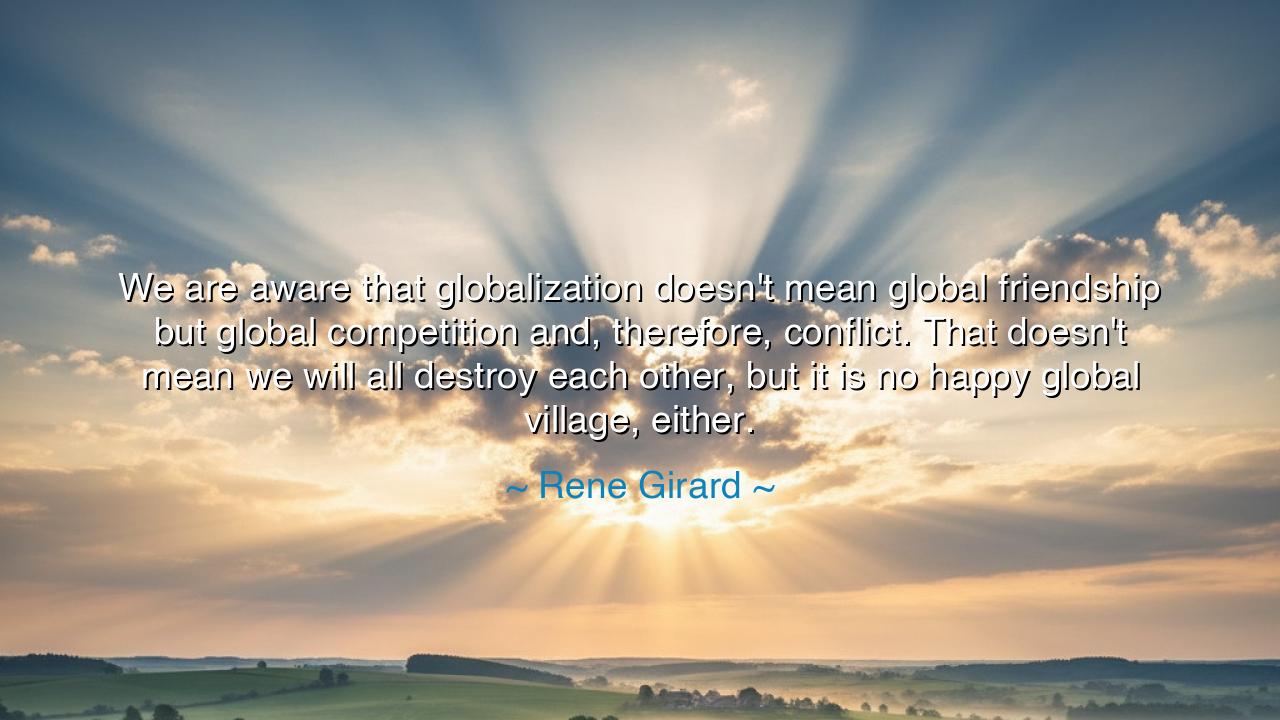
We are aware that globalization doesn't mean global friendship
We are aware that globalization doesn't mean global friendship but global competition and, therefore, conflict. That doesn't mean we will all destroy each other, but it is no happy global village, either.






“We are aware that globalization doesn’t mean global friendship but global competition and, therefore, conflict. That doesn’t mean we will all destroy each other, but it is no happy global village, either.” Thus spoke René Girard, the philosopher of desire and the seer of human rivalry — a man who looked into the heart of modern civilization and saw not harmony, but tension disguised as unity. His words carry the weight of prophecy, spoken not in bitterness but in deep understanding of the human condition. For Girard knew that beneath the shining surface of progress and interconnectedness lies a more ancient truth: that human desire, when mirrored too closely, breeds not peace, but envy — and that envy, if left unchecked, gives birth to conflict.
The modern world, though bound by cables, commerce, and communication, is still ruled by the same ancient passions that stirred the cities of old. Globalization, Girard warns, has not united the hearts of men — it has merely brought their ambitions into closer collision. Once, kingdoms warred across distant seas, separated by barriers of distance and ignorance. Now, those barriers are gone. We see each other, compare with each other, and covet what others possess — wealth, power, beauty, and influence. Thus, the global village he speaks of is not a place of shared joy, but a crowded marketplace where every eye is a mirror, reflecting desire and rivalry in endless echo.
To understand Girard’s meaning, one must grasp his great insight: the mimetic nature of desire — that men desire not things for their own sake, but because others desire them. From this imitation springs jealousy, and from jealousy, conflict. Globalization has made this mirroring universal. The dreams of one nation become the envy of another; the success of one man becomes the shame of his neighbor. The world, once vast, has become a single stage where all compete for light — and the light, by its very nature, cannot shine on all at once.
Consider the story of the Cold War, that long and perilous dance between the superpowers of the twentieth century. It was born not of direct hatred, but of mirrored ambition — each side reflecting the other’s fears and desires. They built weapons because the other built them; they sought influence because the other sought it. It was mimetic rivalry on a global scale, and though the world did not perish in flames, the threat of destruction hung heavy for generations. Girard’s wisdom shines here: globalization, or the closeness of nations, does not dissolve enmity; it intensifies it, for proximity magnifies comparison.
Yet, Girard does not despair. He says, “That doesn’t mean we will all destroy each other,” acknowledging that within humanity lies also the capacity for restraint, reflection, and renewal. The awareness of our mirrored desires — the knowledge of rivalry — can itself become a path toward peace, if only we recognize it. For as long as we remain blind to the roots of our competition, we are its slaves. But once we see that our enemy is not the other, but the envy within ourselves, we begin the long journey toward wisdom.
The ancients taught that the first battle a man must win is the battle over his own passions. The same is true of nations. Global friendship will not be achieved through trade agreements or digital networks, but through the taming of our collective pride. When we learn to admire without envy, to cooperate without comparison, then the world may yet grow into a true village — not one of rivalry, but of shared purpose. But until then, we live, as Girard says, not in a paradise of unity, but in a battlefield of desires clothed in the language of progress.
So, my child, take this lesson to heart: in a world that grows smaller, let your heart grow larger. Do not let the nearness of others breed envy, but empathy. When you see another’s success, do not covet it, but learn from it. When you meet competition, meet it with honor, not hostility. For the peace of the world begins in the peace of the individual soul. Globalization need not be a curse — but only if we temper ambition with humility, and rivalry with respect.
And thus we return to Girard’s wisdom — that though the world has been bound together by wires and winds, it has not yet been united by spirit. The true global village will not be built by markets or machines, but by hearts that seek not to surpass one another, but to understand. Only then shall humanity rise above the endless mirror of desire — and walk together, at last, not in competition, but in communion.






AAdministratorAdministrator
Welcome, honored guests. Please leave a comment, we will respond soon